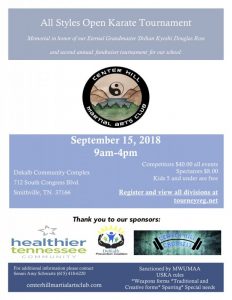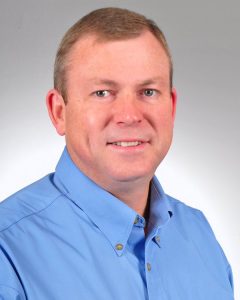News
Open Style Karate Tournament Fundraiser to be held at the DeKalb County Community Center
September 7, 2018
By:
Center Hill Martial Arts Club is hosting the second annual open style karate tournament on September 15, in the DeKalb Community Center auditorium at 712 South Congress Blvd. Smithville Tn.
Competitors should arrive at 9 am, doors will open to the public at 10 am. The event charges $8 for spectators, and $40 per competitor for all events. The traveling competition team will hold a bake sale, and beverages will be available.
This year the tournament will be held in honor of the former head instructor Shihan Douglas Ross, who passed away earlier this year.
Events that competitors may enter include fighting, forms, weapons forms, and a creative Kata division. Black Belts will compete first, then all colored belt events will take place.
Center Hill Martial and Healing Arts Club has been teaching yoga and martial arts classes in Smithville for the last 6 years. Offering gentle yoga classes, power yoga classes and all ages, family style martial arts classes since 2012, the club moved into a their new space in February this year, at 2580 Nashville Hwy, Smithville, TN. You can find out more about practice times and classes taught at centerhillmartialartsclub.com or by calling 615-418-6220.
Sullivan Attains Prestigious Distinction
September 7, 2018
By:
James Sullivan of Smithville, vice president customer experience officer of Motorists Insurance Group, has earned the Master of Insurance Operations Professional (MIOP) level of distinction. He is the first Motorists associate to do so and is one of only two in the world to hold this designation to date.
The MIOP distinction is earned by completing four graduate level courses of study: Chartered Insurance Operations Professional (CIOP), Lean Six Sigma Black Belt (LSSBB), Customer Experience and Analytics Professional (CXAP) and Master of Change Management & Coaching (MCMC).
Motorists is committed to being a leader in the industry and looks for the same enthusiasm for progress in their associates.
“I think it speaks volumes of James’ commitment to continuous professional development and to his high standard of excellence and dedication to his role as a leader in our organization,” said John Kessler, senior vice president and chief strategy officer of Motorists. “I couldn’t be more proud of him.”
Through earning this distinction, Sullivan gained deep knowledge and insights that set a precedent for pursuing professional development, not only for other Motorists associates, but also for the global insurance industry.
DeKalb Among Top 20 Tennessee Counties for Opioid Prescription Rates
September 7, 2018
By:
Although the number has decreased in recent years, DeKalb is still one of the Top 20 counties in the state for opioid prescription rates.
According to statistics from the Center for Disease Control (CDC), DeKalb ranked 18th in the state in 2016 with an opioid prescribing rate of 161.2 prescriptions per 100 persons.
The number of opioids prescribed in the United States peaked in 2010 and then decreased each year through 2015. DeKalb’s rate followed a similar pattern, peaking in 2012 at 230.9 prescriptions per 100 persons. Since then, the rate has fallen each year at 215.8 in 2013, 208.7 in 2014 and 180.3 in 2015.
The CDC points out that healthcare providers began using opioids in the late 1990s to treat chronic pain (not related to cancer), such as arthritis and back pain. As this continued, more opioid prescriptions were written, for more days per prescription, in higher doses.
Opioid use soon became a major problem in Tennessee and across the nation. In 2007-2008, Tennessee led the nation in the number of residents over age 26 who abused prescription opioids. In 2010, 3, 379 Tennessee residents entered treatment programs for prescription opioid addiction.
It has also been reported that 70 percent of people who abuse prescription opioids obtain their supply from friends or family members while four (4) percent buy from dealers. Only 17 percent have a legitimate prescription from a physician.
The problem became so severe, the Tennessee Legislature recently addressed the issue.
Under a new law, pharmacists can only partially fill a prescription for no more than half of the number of days for which it is written. There are also other limits. General prescriptions are limited to a 10-day supply with prescriptions after surgery limited to a 20-day supply.
The law technically went into effect July 1, but to allow pharmacies a chance to update their software, the changes will not be mandated until January 1 next year. By law, before an opioid prescription can be filled, pharmacists must check the Controlled Substance Monitoring Database, which logs each time you fill a prescription for a controlled substance. The database must be checked when someone first brings a prescription to a pharmacy, and then again at least once every six months as long as a person is getting refills.
In addition, a physician must document the specific reasons a person is getting an opioid drug, along with the fact the patient is getting it with informed consent. Pharmacists also no longer have limits on discussing opioid-related issues with customers.
Some prescriptions, such as those for patients getting palliative cancer treatment or hospice care, are exempt. However, the physician must still write a diagnosis code and “exempt” on such prescriptions.
*Numbers used for the prescribing rates were based on a sample of approximately 50,000 retail (non-hospital) pharmacies, which dispense nearly 90% of all retail prescriptions in the U.S. For this database, a prescription is an initial or refill prescription dispensed at a retail pharmacy in the sample and paid for by commercial insurance, Medicaid, Medicare, or cash or its equivalent.
« First ‹ Previous 1 2138 2228 2236 2237 22382239 2240 2248 2338 2502 Next › Last »










